Saturday, August 7
We spent our two-and-one-half days in Baker Lake in leisurely walks, attending to errands and business. Two trips to the RCMP to inform them that we had arrived. Three visits to each of the four arts and crafts centres to select gifts for family, house-sitters, and work colleagues. For ourselves, to commemorate our Thelon River adventure, we purchased a pastel drawing by Simon Tookoomik, a Baker Lake Inuk. Writing postcards, buying stamps, frequenting the visitor's centre, and dinners at the lodge easily filled our time. Best of all, the vagaries of wind no longer dominated our senses and actions.
On Friday morning we called Loon Air in Fort Smith to confirm our flight that afternoon. After three unsuccessful attempts, the operator informed us that Loon Air's business number was no longer in service! Had they gone out of business, stranding us in Baker Lake? Not likely, we reasoned, and tried again an hour later. Our call now went through, and we learned that all lines had been knocked out by an electrical wind storm, and that our charter plane was already in the air.
Moments later, the Cessna 185 flew over the Baker Lake Lodge, and landed in front of the Northern Store. We scurried to our room, portaged the gear to the canoe, and paddled to the now-fuelled plane.
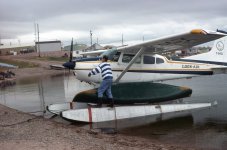
While we stood on the pontoon waiting to enter the cabin, two paddlers just in from the Kazan River walked across the beach to talk about Barren Grounds canoeing. They had arrived only hours before, and their faces literally glowed with enthusiasm and excitement. I envied them, as my own emotions were much less joyous. Perhaps now that we had paddled the Thelon River and its tundra lakes, simply by living one day at a time, the journey's very remarkable qualities seemed normal, arcane and mundane. Perhaps the joy and sense of special accomplishment will come later.
As always before a flight, my heart beat faster and my stomach churned. I relaxed somewhat watching our pilot, Paul, inspect all the plane's checkpoints. Our depleted supplies allowed much more room for me to sit comfortably in the rear of the cabin, and I snuggled down amongst the packs. After a smooth take-off, we flew evenly over the tundra. Only one more take off and two more landings. We just might make it!
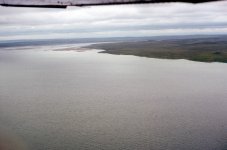
Paul took off easily into the north wind, and we banked south toward Fort Smith, our direction "locked in" by the global positioning system. Below, the Barren Grounds stretched endlessly, dominated by lakes and water courses. We flew silently across the unchanging landscape. Had we really traversed this open emptiness alone? Wow!
We crossed Dubawnt Lake, an immense body of water, purported by Paul to be as large as Massachusetts.
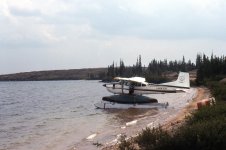
A short time later we landed at Damant Lake for refuelling. The float plane coughed and wheezed, and sputtered against the shore next to the ubiquitous red-and-yellow fuel drums.
"Cracked fuel line," Paul remarked, with incredible nonchalance. “I'll try to fix it." (Note: In fact, I had been smelling gasoline fumes in the plane for the last 30 minutes. Paul hadn't looked worried, though.)
I watched nervously as Paul removed the front fuselage and unpacked his screw drivers and other tools.
"I could jerry-rig this to work, but I don't want to take a chance. I'll radio for help."
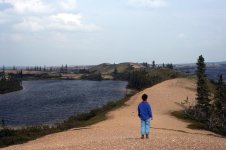
Kathleen and I considered this to be good news. We weren't ready yet to go home.
Michael and I wandered onto the esker, then back down into the trees -- a special treat for us after nearly six weeks on the Barrens. We settled in the shelter of a hill away from the strengthening winds. Our sausages, peanut butter, crackers and gorp made a good meal. Paul joined us after relaying a message to Fort Smith, through Yellowknife. As the afternoon lengthened into evening, we considered putting up the tent. Michael eagerly talked about catching fish for dinner. I was hoping not to be saved just yet, as I very much wanted to continue living in the Barren Grounds. All too soon, however, we heard the drone of the approaching rescue plane that would eventually carry us away, back to Fort Smith.
About 8:30 pm, a second Cessna 185 landed on Damant Lake. Dick, the manager and mechanic of Loon Air held the required replacement part in his hand, and he immediately began repairing the broken fuel line. The pilot, Don, greeted us enthusiastically, and pumped us for information about our adventures since he had left us at Lynx Lake on that warm afternoon in June.
After quickly completing the repair with a 50-cent piece of tubing, Dick suggested that Michael and I should travel in the "rescue" plane. I worried about flying in the now deepening dusk. Even though we couldn't make Fort Smith before nightfall, both pilots wanted to at least get off the Barrens. Thekulthili Lake, about 1 hour away, became our destination. Paul took off first, without incident. We followed, but soon passed the first plane, which was slowed by our canoe strapped to the pontoon. Although not yet legally night, the lake looked dark as Don flew low over the water surface, looking for rocks and shoals. Paul landed about 5 minutes later, and we all tied up to shore in front of a rustic fishing lodge.
Once our sleeping bags were spread on the bunks we enjoyed a beer, compliments of Dick and Loon Air. The rest of the evening passed quickly, as we listened to stories of flying and mishaps in this vast, empty land.
We awoke to a heavy mist hanging over the lake. As we drank our coffee, we stared toward the end of the lake, searching hopefully for signs that the fog may be lifting. Don and Paul studied the maps, looking for water routes above which they could fly safely. Don was ready when the far shore became visible, so we taxied down the lake and took off for Fort Smith.
The fog soon thickened, and I strained ahead to see potential obstacles that might suddenly emerge from the mist that now covered the land. Don banked sharply, and turned back and landed on a small, unnamed patch of water barely visible beneath the thickening mist. Another landing! Rocky, steep, well-treed banks surrounded this lake, contrasting sharply to the open tundra to which we had become so accustomed.
Don flew in fog only when he could see lakes, which provided potential emergency landings. He never flew in fog over land. We appreciated Don's cautious motto: "Never close the back door. When the Barrens bite, they bite hard."
We had violated Don's creed when we entered the S-bend without scouting, and without knowing beforehand that we could get off the river if necessary. We had closed the back door when we entered the canyon (The S Bend), and barely slipped through the front door before it slammed shut. We narrowly, and somewhat luckily, avoided being bitten very hard.
About an hour later, the ceiling lifted slightly, revealing the lake's far shore. After taking off for the second time this morning, the southern horizon continued to become brighter. Just before lunch we taxied up to the Loon Air float dock on Four Mile Lake. Paul didn't arrive with our gear and canoe until around 4:00 pm; he had been unable to leave the fishing lodge this morning, as the fog returned to Thekulthili Lake only moments after Don, Michael and I had flown away.
We returned to the Pelican restaurant for the pizza we'd been looking forward to since arriving in Baker Lake. After dinner Don, Paul and another young pilot joined us at our Fort Smith campsite for beer and more bush-pilot stories. The skill of these pilots had safely transported us to and from the Thelon River. It seemed fitting to end our adventure in their company.
(Note: You might remember that when we left Fort Smith last June 28, that I told Don we were at 600 pounds, when we were actually at 650 pounds, 50 pounds over the allowed maximum. I mentioned this to him, and told him how worried I was when the plane wasn't lifting up. He said, "I know. People often lie to me about their weight. When suspect that, I put my ball cap on backwards, get a crazed look on my face, and scare the hell out of them.")
Back Home
It's good to be home, but I miss the river already. Despite being dominated by wind and water, we alone determined our daily activities. If the wind whipped up waves too high for paddling, we rested. If the river plunged through canyons or over ledges, we portaged. Other than for our self-imposed deadline of August 6 for reaching Baker Lake, time was interesting, but otherwise meaningless.
We had lived and travelled through an everlasting landscape. We had shared our journey with plants, birds, caribou, muskoxen, bears and wolves, all of us participating in the predictable progression of seasonal change. The concept of linear time, with beginning and end, is viewed by many native cultures as an artificial perspective. In reality, there is no beginning. There is no end. Seasonal cycles spin forever. As they always have. As they always will. Living within such cycles, time is irrelevant. Time can not be saved. Time can not be lost. Without a linear construct, time can not exist.
In Vancouver, time assumes nearly paramount importance. We arrived home on Wednesday evening, with four days to be ready for our commute beginning precisely at 7:06 on Monday morning. I spent Thursday and Friday tending to eight weeks of accumulated garden weeds and household chores. As I collected together the necessary gardening implements, I noticed a flat tire on the commuter car. No problem. I expected this, as the tire had been leaking slowly before we left. I wrestled the spare out of the trunk. It too was flat. Not too flat to drive, though. I inserted the key in the ignition. Click..click...click. Dead battery. A call to the BC Automobile Association instructed me to be ready in exactly 40 minutes.
Into the garden with hoe in hand. Ten minutes later Kathleen emerged from the laundry room with news that the dryer no longer produced heat. Back to the phone to contact the appliance store. The unseen voice told me they opened at 10:00, and might have replacement parts for our 20-year-old dryer.
On the river, all our equipment was functional and reliable, with virtually no moving parts. Self-sufficiency was blissfully easy. Alleged conveniences of civilization in Vancouver were frustratingly domineering by comparison. The phone rang demandingly. News of a house-warming party in the Fraser Valley. Drinks at 4:30 pm for dinner at 6:00.
The assembled guests expressed genuine interest in our Barren Grounds adventure. We basked in the 15 minutes of fame promised to all of us by Andy Warhol. Our fans ebbed and flowed during the evening, asking questions that invariably followed a predictable pattern.
"Did you see any bears?"
"Three."
"How close?"
"One was about from here to that far wall."
"Did you take a gun?"
"No, just cayenne pepper spray."
"Were the bugs bad?"
"They were horrible. Worse than I ever imagined they could be."
"How was the weather?"
"Variable. Wind -- particularly wind. Sun and rain. No snow, though. Our coldest temperature was 4[SUP]0[/SUP] C."
"How long was the trip?"
"Five-and-one-half weeks; 950 km (590 miles). But it didn't really seem so long. You just live one day at a time no matter where you are. It's no different or longer than living in Vancouver for five-and-one-half weeks."
"Did you have an air drop for food?"
"No, Kathleen dehydrated all our food, which was excellent. We even have food left over."
"Did you have a radio?"
"No, but we did take an EPIRB for emergencies." (Note: I know the discussions around an EPIRB. Don't yell at me. It's what our club had. We borrowed it.)
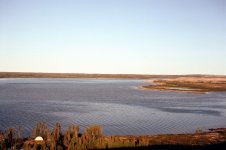
Our camp on Eyeberry Lake, where our canoe blew to shore on July 2.
All very logical questions, but all of them totally missing the essence of wilderness canoeing. When my thoughts drift back to our quest, they settle comfortably on the multitudes of geese that gave us constant companionship. I can still see us drifting toward shore, anxiously surveying the bank for suitable camping sites. I can still see us eating bannock on a sunny morning, gazing restfully over a lake equally at rest. I can still see the orange-spotted white petals of prickly saxifrage, growing delicately among the riverside cobbles at the Mary Francis River. I can still taste the tart fruit of the blueberry, growing modestly in a tangle of lichens above Aleksektok Rapids. And, I can still remember lying in the tent pitched above Schultz Lake, listening to the hushed breath of absolute silence that reached out to us from beyond infinite, isolated tundra lakes and mountains.
More important than these images, however, is the enduring magic and memory of the nomadic experience of travelling through Canada’s pristine, northern landscape. It seems that none of our friends ever asks us the question most relevant to why Kathleen and I canoed alone 950 km across the Barren Grounds.
"How was the freedom?"
"Exquisite and absolute.
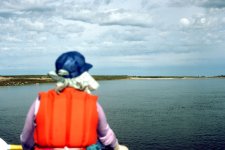
"It was as though Kathleen and I were the only two people in the world, travelling through a landscape so vast that it still functions as it has since the days it was first created.”
We could hardly wait to go again.






